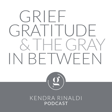
Reflections on Grief: 200 Voices, 5 Years, and the Journey of Healing
Welcome to a very special episode of Grief, Gratitude, and the Gray In Between. Today, we celebrate a milestone—our 200th episode! Over the past five years, I’ve had the privilege of sitting down with nearly 200 incredible individuals, each sharing their unique experiences and perspectives on grief.
Grief is complex. It’s not just about loss—it’s about transitions, expectations, healing, and everything in between. In honor of this journey, we’re revisiting some of the most profound moments from past conversations—voices that have shaped this space, challenged misconceptions, and offered wisdom on navigating grief and finding light through the darkness.
Join me as we reflect, honor, and learn from the many voices that have guided us over the years. I’m so grateful for this community. If you feel you resonate with any of the insights shared by my guests, I invite you to look for the full interview I've done with them.
- Episode Timeline:
- Jana DeCristofaro – The layered emotions of grief, relief, and guilt.
- Kendra Rinaldi – Reframing grief as transition through Baha’i teachings.
- Carol Schneberg – How we grieve the way we live, shaped by hospice insights.
- Tawny Platis – Finding comfort in metaphysical views on time and connection.
- Sophie Mills – How loss led her to question lifelong atheist beliefs.
- Jenny Robinson – Surrendering to a loved one’s journey and finding peace.
- Daniel Rinaldi – Honoring his mother’s passing through music and reflection.
- Aijia Grammar – The isolation of grief when it’s unacknowledged.
- Colin Campbell – Confronting denial and choosing to live with purpose.
- Bevin Mugford – Learning from hardship and finding wisdom in pain.
- Rabbi Steve Leder – Rejecting grief “stages” and embracing waves of emotion.
- Edy Nathan – Grief as a dance—fluid, messy, and deeply personal.
- Nathan Peterson – Floating through grief when pushing forward feels impossible.
- Pixie Lighthorse – The power of permission to fully experience grief.
- Grant Garry – Letting grief express itself instead of suppressing it.
- Tatiana Zamir – Processing grief through unfinished business and peace.
- Stephanie Matos – Using grief as a catalyst for personal growth.
For more information about the different services I offer (Speking, Grief Education, Grief Coach) Or to be a guest on the Podcast reach out: griefgratitudepodcast@gmail.com or on my website. https://www.griefgratitudeandthegrayinbetween.com/


